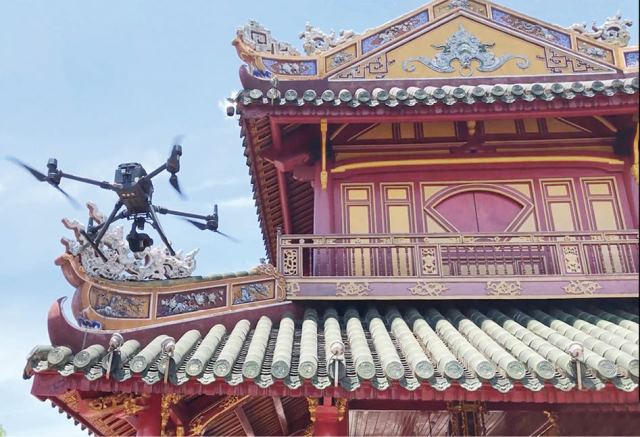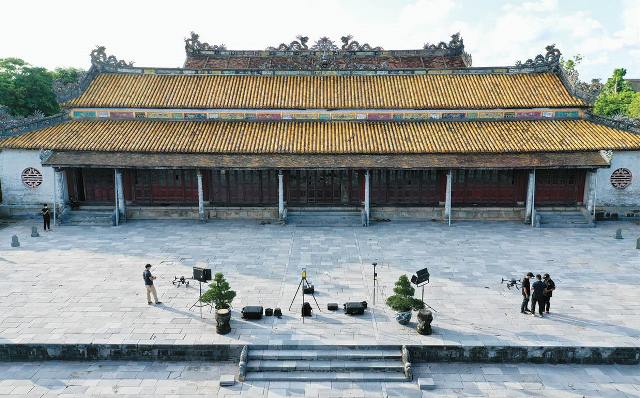Thanks to the 3D-scanning application, data of the status quo of architectural works in Hue heritage complex were obtained and stored. These data are used for conservation as well as for virtual reality (VR) tours.

Using modern instruments for digitalization
Restoring with high quality and high solution
Prior to the dismantlement of Thai Hoa Palace for restoration, Hue Monuments Conservation Center had the AGS Technologies 3D-scan the palace for the purposes of restoration, and for services of VR tours.
3D-digitalizing Thai Hoa Palace makes it possible to restore the space truly and sharply. The digital data of Thai Hoa Palace is accessible by stakeholders in the process of conservation, restoration or research. This is a resourceful reference for managers and conversation contractors in terms of color, size and section after the dismantlement. Errors during restoration are easy to be detected and corrected.
The data set has also been integrated in the interactive VR tour website for visitors. Therefore, while Thai Hoa Palace is under restoration, visitors can still visit this unique palace thanks to VR technology. Visitors can explore the palace on their hand phones or other devices with internet access, or they experience their tour with VR lenses.

AGS Technologies is in charge of 3D-scanning digitalization of Thai Hoa Palace
According to Mr. Hoang Viet Trung, Director of Hue Monuments Conservation Center, 3D digitalization plays an important role in the restoration of Thai Hoa Palace and in the standardization of data bases. The 3D technology minutely displays sizes, colors and patterns, serving primarily the restoration and work supervision, as well as the reference after dismantlement to avoid errors. Data bases are also for education, research, museum work and tourism.
Mr. Tran Ngoc Binh, AGS Technologies Chief Operations Officer, said that the work has been done via 3D scanners. Simply put, 3D laser scanners do the scanning of the palace three-dimensionally and gather information about different perspectives of the site.
In addition, drones have been used to scan the upper structures where scanners cannot reach. AGS specialists will transform data and images captured on-site into 3D models via computer professional software. This helps Hue Monuments Conservation Center better their research, conservation and restoration of Thai Hoa Palace more effectively and accurately.
Thai Hoa Palace has now been eternal in the VR3D. Tourists can visit the site anywhere anytime at one click
Enabling connectivity among destinations
AGS Technologies is one of the leading companies in Vietnam in digitalization. Apart from Thai Hoa Palace, it digitalizes 3D images of many historical and cultural sites, including An Dinh Palace, Hue Museum of Royal Antiquities, Imperial Academy, Khai Dinh Tomb and the Citadel.
AGS Technologies has also contributed to the development of 3D smart city and geospatial data of Thua Thien Hue; the building of VR3D helps communicate and develop digital tourism locally. The 3D scanning technology becomes an instrument to preserve and promote historical values and beauty of the architectural works under the Nguyen Dynasty, promising the development of e-heritage for Hue.
The historical relics are currently in severe degradation due to the impacts of time and environment. There are almost no 2D or 3D blueprints for these constructions. Even there is one, it lacks certain information or has blur images, causing difficulty to retaining the characteristics of each work during restoration and repair.
Mr. Tran Ngoc Binh emphasized that 3D scanning was the world’s most advanced technology that enables true and sharp restoration. This helps save ancient architectural data for a long time to respond to the demand for rapid and accurate restoration.
This is also an effective method to promote a form of tourism to explore a destination without coming to the site, especially in the time of pandemic. All spaces, colors and images are redesigned with accuracy in virtual reality.
With three viewing modes, a 360° rotating multi-dimensional 3D angle, and short, successive and minute movements, users can actively interact directly with unlimited space and move to any site. This brings a vivid and lifelike feeling.
Today, digital technology with its low-cost and time-efficient advantages is an outstanding technology trend. Within 24-48 hours, a site can be scanned and 3D-digitalized. Users could visit and explore any place easily.
Therefore, this technology enables the connectivity, provides communication measures and enhance the competitiveness of tourist destinations. Developing smart tourism digitally not only provides conveniences for visitors but also improves management capacity, catching up with the 4.0 trend, especially in the context of covid-19 impacts. Digitization brings remote experiences for visitors and enhances the value of tourist destinations.
Story: Minh Hien - Photo credit: AGS